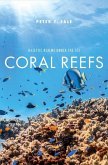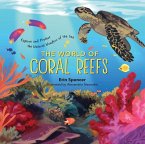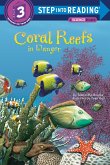Charles R.C. Sheppard (Professor, Professor, School of Biological S, Simone Davy (Head of School, Head of School, School of Biological S, Graham M. Pilling (Principal Fisheri Principal Fisheries Scientist
The Biology of Coral Reefs
Charles R.C. Sheppard (Professor, Professor, School of Biological S, Simone Davy (Head of School, Head of School, School of Biological S, Graham M. Pilling (Principal Fisheri Principal Fisheries Scientist
The Biology of Coral Reefs
- Broschiertes Buch
- Merkliste
- Auf die Merkliste
- Bewerten Bewerten
- Teilen
- Produkt teilen
- Produkterinnerung
- Produkterinnerung
A concise but comprehensive introduction to the biology of coral reefs, providing an overview of the ecology of coral reefs and their functioning, and the biology of their major species groups. The responses to modern environmental pressures, climate change, and use of their resources is also described.
Andere Kunden interessierten sich auch für
![The Biology of Lakes and Ponds The Biology of Lakes and Ponds]() Christer Bronmark (Professor, Professor, Aquatic Ecology Unit, DepaThe Biology of Lakes and Ponds62,99 €
Christer Bronmark (Professor, Professor, Aquatic Ecology Unit, DepaThe Biology of Lakes and Ponds62,99 €![Coral Reefs Coral Reefs]() Peter F. SaleCoral Reefs27,99 €
Peter F. SaleCoral Reefs27,99 €![The World of Coral Reefs The World of Coral Reefs]() Erin SpencerThe World of Coral Reefs22,99 €
Erin SpencerThe World of Coral Reefs22,99 €![The Stone Reefs of Brazil, Their Geological and Geographical Relations, With a Chapter on the Coral Reefs The Stone Reefs of Brazil, Their Geological and Geographical Relations, With a Chapter on the Coral Reefs]() John Casper BrannerThe Stone Reefs of Brazil, Their Geological and Geographical Relations, With a Chapter on the Coral Reefs40,99 €
John Casper BrannerThe Stone Reefs of Brazil, Their Geological and Geographical Relations, With a Chapter on the Coral Reefs40,99 €![The Remarkable Reefs of Cuba The Remarkable Reefs of Cuba]() David E. GuggenheimThe Remarkable Reefs of Cuba22,99 €
David E. GuggenheimThe Remarkable Reefs of Cuba22,99 €![Coral Reefs in Danger Coral Reefs in Danger]() Samantha BrookeCoral Reefs in Danger7,99 €
Samantha BrookeCoral Reefs in Danger7,99 €![Coral Reefs Coral Reefs]() Kristin Baird RattiniCoral Reefs10,99 €
Kristin Baird RattiniCoral Reefs10,99 €-
-
-
A concise but comprehensive introduction to the biology of coral reefs, providing an overview of the ecology of coral reefs and their functioning, and the biology of their major species groups. The responses to modern environmental pressures, climate change, and use of their resources is also described.
Hinweis: Dieser Artikel kann nur an eine deutsche Lieferadresse ausgeliefert werden.
Hinweis: Dieser Artikel kann nur an eine deutsche Lieferadresse ausgeliefert werden.
Produktdetails
- Produktdetails
- Biology of Habitats Series
- Verlag: Oxford University Press
- 2 Revised edition
- Seitenzahl: 384
- Erscheinungstermin: 10. Februar 2018
- Englisch
- Abmessung: 231mm x 156mm x 27mm
- Gewicht: 680g
- ISBN-13: 9780198787358
- ISBN-10: 0198787359
- Artikelnr.: 48855278
- Herstellerkennzeichnung
- Libri GmbH
- Europaallee 1
- 36244 Bad Hersfeld
- gpsr@libri.de
- Biology of Habitats Series
- Verlag: Oxford University Press
- 2 Revised edition
- Seitenzahl: 384
- Erscheinungstermin: 10. Februar 2018
- Englisch
- Abmessung: 231mm x 156mm x 27mm
- Gewicht: 680g
- ISBN-13: 9780198787358
- ISBN-10: 0198787359
- Artikelnr.: 48855278
- Herstellerkennzeichnung
- Libri GmbH
- Europaallee 1
- 36244 Bad Hersfeld
- gpsr@libri.de
Professor Charles Sheppard has spent over 40 years researching the ecology of coral reefs and their role in supporting islands and coastal communities. He is interested especially in effects of pollution and climate change on tropical marine systems, has been Editor of the scientific journal Marine Pollution Bulletin for 23 years, and now is Editor of Advances in Marine Biology. He is now Emeritus Professor at the University of Warwick and was awarded the OBE for his work in conservation in the Indian Ocean. Professor Simon Davy is a specialist in the fields of coral-algal symbiosis and coral disease. He studied for his PhD at Bangor University. He then conducted postdoctoral research at the Harbor Branch Oceanographic Institution in Florida and the University of Sydney, before holding faculty positions at the University of Plymouth and now Victoria University of Wellington, where he is Head of the School of Biological Sciences. He is also President of the International Symbiosis Society and a topic editor for the scientific journal Coral Reefs. Dr. Graham Pilling has over 20 years experience in applied fisheries science to support management, and has gained practical experience in tropical and coral reef ecosystems, including in the Indian Ocean, Arabian Gulf, and Pacific Ocean. His work has focused on stock assessment, evaluating feasible management approaches for fisheries at a range of geographic scales, and the implications of climate change for coral reef ecosystem services. He currently holds the post of Principal Fisheries Scientist at the SPC Oceanic Fisheries Programme in New Caledonia. Professor Nicholas Graham's research tackles large-scale ecological and social-ecological coral reef issues under the overarching themes of climate change, human use, and resilience. Increasingly he works with social scientists and economists to assess methods of linking social-ecological systems for natural resource assessment and management.
1: Coral reefs: biodiverse and productive tropical ecosystems
2: The main reef builders and space occupiers
3: The abiotic environment
4: Symbiotic interactions
5: Microbial, microalgal, and planktonic reef life
6: Reef fishes: evolution, diversity, and function
7: Reef fisheries and reef aquaculture
8: Coral reefs in the modern world
9: Consequences to reefs of changing environmental stress
10: The future, human population, and management
2: The main reef builders and space occupiers
3: The abiotic environment
4: Symbiotic interactions
5: Microbial, microalgal, and planktonic reef life
6: Reef fishes: evolution, diversity, and function
7: Reef fisheries and reef aquaculture
8: Coral reefs in the modern world
9: Consequences to reefs of changing environmental stress
10: The future, human population, and management
1: Coral reefs: biodiverse and productive tropical ecosystems
2: The main reef builders and space occupiers
3: The abiotic environment
4: Symbiotic interactions
5: Microbial, microalgal, and planktonic reef life
6: Reef fishes: evolution, diversity, and function
7: Reef fisheries and reef aquaculture
8: Coral reefs in the modern world
9: Consequences to reefs of changing environmental stress
10: The future, human population, and management
2: The main reef builders and space occupiers
3: The abiotic environment
4: Symbiotic interactions
5: Microbial, microalgal, and planktonic reef life
6: Reef fishes: evolution, diversity, and function
7: Reef fisheries and reef aquaculture
8: Coral reefs in the modern world
9: Consequences to reefs of changing environmental stress
10: The future, human population, and management








